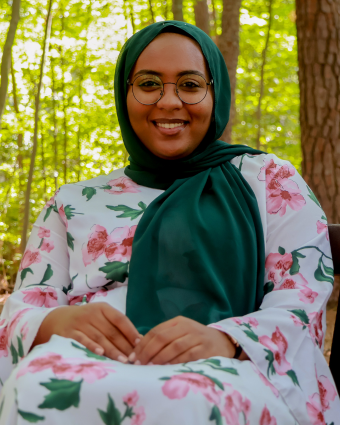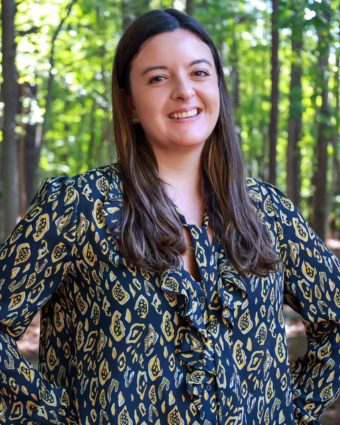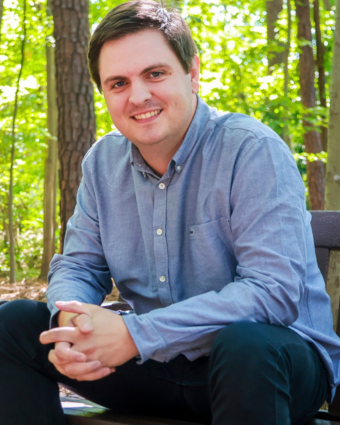Meet the LLM Class of 2024
Five students from the Duke Law LLM Class of 2024 tell us why they chose Duke Law and how they hope to make an impact
 Rowa Taha
Rowa Taha
Rowa Taha made the decision to pursue a legal career in high school. It was a combined sense of care for her home country, Sudan, and a belief that there ought to be more diligence in civics that inspired her.
While studying law at the University of Khartoum, Taha started a project called “Know Your Rights” to introduce more comprehensive legal education in Sudanese schools.
“Legal education is vital to better society overall. In a world where everyone knows their rights and their duties, we can avoid clashes of people,” she said.
Taha is one of 85 students from 35 countries and territories in Duke Law School’s LLM class, and the program’s first student from Sudan. The master’s degree is designed to introduce graduates of foreign law schools to the legal system of the United States and to provide the opportunity to take advanced courses in specialized areas of the law.
Before making her way to the United States to attend Duke, Taha’s home country was torn by a civil war.
“My family and I had to move to Egypt. People left their homes, their cars… It was the saddest day of my life, to have to choose what to take and what to leave behind,” she said. “Now I understand more that civilians need to be more involved in their institutions than they used to be.”
Taha plans to incorporate her core values in human-centered lawyering into her study of intellectual property law.
“While I was in uni, I had a part-time job teaching information communication technology. These kids were asking me questions I didn’t know the answer to, like ‘Who owns the internet?’ and ‘If you take someone’s painting, how would they know?’ and it made me question things a lot, which made me feel that IP was the branch of law for me,” she said.
Taha said she is also excited to bring her Sudanese heritage to the Law School while she studies at Duke.
“Our traditions are very diverse. We have traditional dances, our food, and facts: for example, Sudan actually has more pyramids than Egypt,” said Taha. “I want to tell more people about Sudan. I feel like not a lot of people know about the war going on, and I hope that other countries learn from the Sudanese experience and be more involved in their governments.”
Back in Sudan, Taha practiced martial arts, and she plans to join Duke’s Jiu-Jitsu club. She also looks forward to getting involved in the Global Law Student Association and attending her first American football game.

Vicente Grez and Teresa Polgatti met on holiday in Ecuador while they were both studying law at the Pontificia Universidad Catholica de Chile School of Law. Now married, the pair have been classmates for 10 years, a journey they are continuing together at Duke Law.
“We can live the same experience together. I believe most people who come here married, only one is studying and the other is missing this great experience, and in our case we’re in the same courses and meeting all these new people together,” said Grez.
“It was destiny and a very good decision for us. I think we are very privileged to be here together. It is definitely unique,” said Polgatti.
Polgatti decided it was time to advance her studies while doing transactional work for a large, private firm in Chile, where she was an associate attorney in the corporate-capital markets department and active in pro bono service. Duke stood out for its course offerings and her experience with Duke Law representatives.
“I met with Dean [Oleg] Kobelev in Buenos Aires, and he explained to us about Duke and all that it had to offer. Duke treated us very well, and he encouraged Vicente also to take this opportunity, so he started preparing for the LLM program as well,” said Polgatti.

Grez was general counsel and chief compliance officer at Automotores Gildemeister SpA, one of the market share leaders in the automotive industry in Latin America, serving clients such as Hyundai, Land Rover, and other major car brands.
The pair are focusing their studies on corporate and financial law. They are not only excited to share their classes this year, but also explore the expansive North Carolina landscapes and build a community of peers at Duke Law and beyond.
“The professional and academic experiences are a huge part of it, but Duke is not only a university it is a community, and we want to experience everything about it,” said Grez. “Being here together, it’s enabled us to meet everyone. We’re in the same classes and Teresa will meet some people and I will meet some people and then we merge groups and it’s amazing.”
Polgatti is looking forward to spending free time at Duke’s recreation centers with friends, while Grez is getting excited for basketball season.
“I always loved sports, and it’s kind of a coincidence, because I rooted for Duke before I was a student here. It was meant to be,” he said.
Mathieu Grimmeissen’s passion for IT and programming began at an early age. By 13, he was recycling computer parts to custom build his own, writing new programs with Java, and producing YouTube content that earned him his first paycheck from Google.

He attended coding camps at MIT and Stanford for two consecutive summers, experiences that are infused in his dream to become an international lawyer with roots in science and technology. At Duke, he is pursuing the LLM Intellectual Property Certificate with a focus on science and technology law.
“I believe, with all the recent innovations, a lawyer should know about tech law and intellectual property laws. It’s well-regarded expertise, and Duke Law is well-known for their expertise in IP,” said Grimmeissen. “Intellectual property is a fascinating area of study, and Professor James Boyle’s approach to it in my classes so far, it’s like seeing a new dimension. It might be the best class I’ve had in my law studies so far.”
Grimmeissen’s bachelor’s studies were concentrated in law and political science at the Institut Catholique de Paris, where he also obtained his master’s in international business law. He graduated with an LLM in International Business Law from St. Mary’s University, Twickenham, London in 2021.
His legal experience includes internships in an investment bank and at McDermott Will & Emery in Paris, where he got the idea of doing an LLM, though he says his non-legal experience also inspired his trajectory towards Duke Law.
In 2020, Grimmeissen began his military service, progressing from recruit to officer. He attended non-commissioned officer school and officer training school for the Swiss Armed Forces, where he gained military tactic, leadership, and stress resistance experience.
“I had the amazing opportunity to lead people and it was the best experience I’ve had so far. It changed my perspective on a lot of things, it made me a more disciplined person, a more open-minded person. I think without the army I wouldn’t have gravitated towards an LLM, because I wouldn’t have been able to get out of my comfort zone to such an extent that I moved to another country to do another master’s degree abroad,” he said.
Since 2020, Grimmeissen has led over 200 soldiers and non-commissioned officers as a deputy company commander and platoon leader. He will continue to serve as a militia officer for the duration of his military service. Outside of his studies, his interests include tennis, cinema, and running. Back in France, he was a competitive fencer and played the violin. While he’s in the United States, Grimmeissen is hoping to “do it all,” or at least as much as each day allows.
“They advise us to take 11 credits for the first semester, and I am taking 14. It’s an ambitious goal, but I don’t want to miss out on anything. I plan to sit the New York bar and to [complete] the IP Certificate. I want to join the Duke Law Tech Review, I want to do some tennis… obviously I won’t be able to do all of it because I need to sleep, but I’m really trying to maximize my experience here and make the best out of it,” he said.
Grimmeissen hopes his LLM studies at Duke will carry him into an international law firm or an internationally focused organization such as the World Intellectual Property Organization (WIPO), which is based in Geneva, where he once lived.

Mariam Moseshvili’s passion for human rights work developed during her time as an undergraduate at the Free University of Tbilisi Schol of Law and solidified in internship and working experiences with the Public Defender of Georgia’s office, where she was the chief specialist for human rights and civil protections cases.
“It felt like something I was born to follow,” said Moseshvili.
Moseshvili’s desire to further her legal education at Duke Law stemmed from questions about how advancements in technology like artificial intelligence will impact human rights. She hopes her studies will better prepare her country to answer those questions in the future.
“Recently, I had a feeling that what I was doing was not enough. We have sets of human rights and standards, but those standards alone don’t help achieve social changes,” she said. “I want to help my country’s disadvantaged groups who need a more improved realization of their human rights, as well as be able to help implement the latest provisions as it pertains to advancing technologies.”
While working with in the Public Defender’s National Human Rights Institution, Moseshvili was assigned to represent Georgia in European working groups that dealt with artificial intelligence cases, an experience that opened her eyes to the knowledge gaps surrounding these new issues.
Throughout the working group discussions, she noticed very few countries had relevant knowledge to contribute on the topics and she often had little to add herself, as Georgia lacked any developments or cases from which to pull information.
“Right now, there’s work being done in a European convention on artificial intelligence. My country will have to implement these provisions and if we don’t have sufficient experience or the necessary expertise, that process will be difficult,” said Moseshvili. “I want to use this time to specialize in these issues so that when I return, I can help implement these provisions when the time comes.”
Moseshvili’s desire to aid Georgia through her continued education earned her this year’s Judy Horowitz LLM Scholarship. The award provides funds to support a deserving student who will have a positive impact on their countries and regions.
Duke Law’s courses on the intersection of AI and human rights law were of particular interest to her throughout her application process, as she aims to lead her country into a new age of policymaking.
“Many courses are oriented on the critical, current issues of human rights as they relate to evolving technology, which is fascinating,” she said. “It feels almost like they have developed these courses based on my expectations, it’s very powerful.”
Moseshvili’s philosophy of lawyering in the human rights space emphasizing immersing oneself in experiences relevant to the parties she aids. This has included attending women’s soccer matches in her home country and at Duke.
“I want to do more than just read the cases and deliver the decisions, even from these kinds of actions. From my experience, clients in this space expect much more of us as human rights lawyers,” she said. “I feel a responsibility as a human rights lawyer through these types of actions to show my support for groups like women in sports, who face many obstacles and stereotypes in their career paths.”
Beyond the classroom, Moseshvili is looking forward to getting involved with student organizations and the International Human Rights Clinic in her spring semester. While she is in Durham, she is planning to say “yes” as much as possible.
“Whenever someone asks to do something, I am in, no matter how much reading I have — because I know that I will do that. I just feel that I really need to be open to anything and everything and that’s what I’m planning to do while I’m here,” she said.